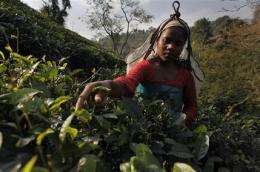Indian tea tastes different due to climate change

(AP) -- Tea growers in northeastern India say climate change has hurt the country's tea crop, leading not just to a drop in production but also subtly altering the flavor of their brew.
Tropical Assam state, with its high humidity and lush greenery, is India's main tea growing region, producing nearly 55 percent of the country's enormous tea crop. Overall, India accounts for 31 percent of global tea production. But a gradual rise in Assam's temperatures, changes in rainfall patterns and a dip in tea production have plantation owners scared.
The area in northern India is the source of some of the finest black and British-style teas. Assam teas are notable for their heartiness, strength and body, and are often sold as "breakfast" teas.
Rajib Barooah, a tea planter in Jorhat, Assam's main tea growing district, called the changes "worrisome developments," and said they had weakened the potent taste of Assam tea. "We are indeed concerned," he said. "Assam tea's strong flavor is its hallmark."
The numbers are stark. Assam produced 564,000 tons of tea in 2007, slipping to 487,000 tons in 2009. The 2010 crop was estimated to be about 460,000 tons, said Dhiraj Kakaty, who heads the Assam Branch Indian Tea Association, an umbrella group of some 400 tea plantations.
Mridul Hazarika, director of the Tea Research Association, one of the world's largest tea research centers, blames climate change for the dropping numbers.
He said temperatures have risen two degrees in Assam the past eight decades. "We feel this is leading to a shortfall in production," he said Friday.
Scientists at the Tea Research Association are analyzing temperature statistics to determine links between temperature rise, consequent fluctuations in rainfall and their effect on tea yields.
"Days with sunshine were far fewer during the (monsoon) rains this year, leading to a shortfall in production and damp weather unfavorable for tea," Kakaty said.
Dampness also aggravates bug attacks on the tea crop.
"A pest called the tea mosquito bug multiplies in damp and cloudy weather and attacks fresh shoots of the tea bush, preventing the plant's regeneration," Kakaty said.
Restrictions on pesticide use because of environmental concerns have added to the planter's woes.
But even more disturbing for growers is the change in the brew's taste. They want the government to fund scientific studies to examine the flavor fallout from climate change.
"Earlier, we used to get a bright strong cup. Now it's not so," said L.P. Chaliha, a professional tea taster.
Rising temperatures are also affecting other crops. Wheat farmers in northern India report - and scientists confirm - that warmer temperatures in recent years have cut sharply into their grain yield, as the crop matures too quickly.
India has proposed a system for sharing technologies between rich and poor countries designed to start freeing up funding and technologies for poor nations that need help coping with a warmer world. These projects include building barriers against rising seas, shifting crops threatened by drought, building water supply and irrigation systems, and improving health care to deal with diseases.
The U.N. science network foresees temperatures rising by up to 6.4 degrees Celsius (11.5 degrees F) by 2100. NASA reported earlier this month that the January-November 2010 period was the warmest globally in the 131-year record. U.N. experts say countries' current voluntary pledges on emissions cuts will not suffice to keep the temperature rise in check.
Developing countries such as India and China need help moving to low-carbon energy systems, such as solar and wind power, and away from the fossil fuels whose emissions are blamed for global warming.
Last year, industrial countries pledged $30 billion in emergency funds through 2012 to help poor countries prepare for climate change, and promised to raise $100 billion a year starting in 2020. Developing countries say at least half of those funds should go to adaptation measures, and the other half toward helping their economies shift to low-carbon growth.
The U.S. has long refused to join the rest of the industrialized world in the Kyoto Protocol, the 1997 adjunct to the climate treaty that mandated modest emissions reductions by richer nations. The Americans complained it would hurt their economy and exempt emerging economies such as China and India.
©2010 The Associated Press. All rights reserved. This material may not be published, broadcast, rewritten or redistributed.















